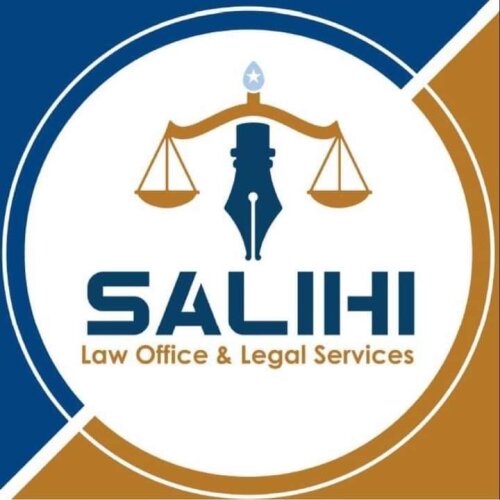Best Sanctions & Export Controls Lawyers in Somalia
Share your needs with us, get contacted by law firms.
Free. Takes 2 min.
Or refine your search by selecting a city:
List of the best lawyers in Somalia
About Sanctions & Export Controls Law in Somalia
Sanctions and export controls refer to a set of laws and regulations that restrict or regulate the cross-border movement of goods, services, technology, and financial assets as well as certain dealings with individuals, entities, or countries. In Somalia, these regulations are shaped by a combination of domestic laws, regional agreements, and international obligations. The goal is to ensure compliance with United Nations Security Council sanctions, deter illicit activities such as arms trafficking, and encourage global peace and security by preventing the misuse of critical goods and technology. Export controls can apply to a wide range of items, including weapons, dual-use goods, and sensitive technologies, while sanctions may target specific individuals, businesses, or entire sectors.
Why You May Need a Lawyer
Navigating sanctions and export controls in Somalia can be complex, especially as they involve both national regulations and international requirements. You may need the assistance of a qualified lawyer in the following situations:
- Engaging in international trade of goods or services that could be subject to restrictions
- Dealing with foreign suppliers, partners, or customers who may be on a sanctions list
- Receiving or sending foreign investment or funds to or from individuals and entities abroad
- Pursuing business opportunities in sectors with known restrictions, such as defense, telecommunications, or natural resources
- Facing investigation by Somali authorities or international bodies for alleged violations of sanctions or export controls
- Conducting due diligence to ensure compliance with evolving regulatory requirements
- Handling disputes with regulatory agencies or appealing penal actions linked to trade restrictions
In any of these scenarios, a lawyer with experience in Somali sanctions and export controls law can help you interpret complex legal provisions, avoid costly mistakes, and develop a compliant business strategy.
Local Laws Overview
Sanctions and export controls laws in Somalia are informed by both domestic and international frameworks. Some of the key factors to consider include:
- United Nations Sanctions: Somalia is subject to several UN Security Council sanctions regimes, particularly those related to arms embargoes, asset freezes, and travel bans. The Somali government is required to enforce these measures locally.
- National Enforcement: The Federal Government of Somalia, through ministries such as the Ministry of Commerce and Industry and the Ministry of Finance, oversees the implementation of export controls and sanctions-related measures. Enforcement has expanded with support from international partners.
- Customs and Border Controls: The Somali customs authorities monitor and regulate goods entering and leaving the country, especially in relation to controlled or dual-use items.
- Financial Regulations: Somalia’s financial institutions are required to screen transactions against global sanctions lists to prevent money laundering and terrorist financing.
- Penalties: Violations of sanctions or export controls can attract serious penalties, including fines, imprisonment, asset forfeiture, and suspension of trade licenses.
- Due Diligence Obligations: Businesses and individuals involved in international trade are expected to conduct due diligence to ensure they are not inadvertently violating restrictions.
Frequently Asked Questions
What are the main types of sanctions affecting Somalia?
Somalia is subject to United Nations Security Council sanctions, including arms embargoes, travel bans, and asset freezes targeting individuals, groups, and entities linked to conflict or terrorism.
Are there specific export controls in place in Somalia?
Yes, export controls are primarily directed at preventing the export, import, or transit of arms and certain dual-use goods, especially items that could contribute to conflict or terrorism.
Who enforces sanctions and export controls in Somalia?
Enforcement is managed by several government ministries, including the Ministry of Commerce and Industry, Ministry of Finance, and law enforcement agencies, often with the support of international partners.
How do I know if a person or entity is on a sanctions list?
Sanctions lists are often maintained at the global level, particularly by the United Nations. Somali authorities may also issue guidance or circulate lists received from international organizations.
What are the penalties for violating sanctions in Somalia?
Penalties can include fines, imprisonment, confiscation of goods, and loss of trade licenses. The severity of the penalty depends on the nature and extent of the violation.
Do export controls only apply to arms and military goods?
No, export controls can also apply to dual-use items, which are goods or technologies that have both civilian and military applications, as well as items that could contribute to internal instability.
Can humanitarian organizations operate under these sanctions?
Humanitarian organizations may operate under specific exemptions or waivers, but they are still required to comply with all relevant sanctions and export control laws.
How often do sanctions and export controls regulations change in Somalia?
Sanctions and export control measures can change frequently, especially as the international situation evolves. It is important to keep updated with government notices and guidance.
Is it possible to appeal a sanctions designation or export control decision?
Yes, there may be procedures for appealing or requesting removal from a sanctions list, either through Somali authorities or the relevant international body.
What should I do if I suspect I might be in violation of export control laws?
You should consult with a qualified and experienced legal professional to assess your situation and develop a course of action to address any possible violations or compliance gaps.
Additional Resources
Several resources and organizations can help you better understand or resolve issues related to sanctions and export controls in Somalia:
- Ministry of Commerce and Industry - For trade regulations and export control requirements
- Ministry of Finance - For financial compliance and reporting obligations
- Somali Customs Authority - For matters related to import and export at borders
- United Nations Security Council Sanctions Committees - For current lists and regime details
- Somalia Financial Reporting Center - For anti-money laundering and counter-terrorism financing information
- International organizations such as the African Union and Intergovernmental Authority on Development - For regional compliance advice
- Legal aid organizations and business chambers - For practical legal assistance and guidance
Next Steps
If you believe you may need legal help regarding sanctions or export controls in Somalia, you should:
- Gather documentation detailing the goods, transactions, or activities you are involved in
- Check if your activities involve any persons, entities, or sectors listed under national or UN sanctions
- Consult with a reputable lawyer specializing in international trade, customs law, or sanctions compliance
- Stay updated on official government announcements and international guidelines related to sanctions and export controls
- If you are facing an investigation or have received an official notice, respond promptly and seek legal representation immediately
By taking these steps, you can protect yourself or your business, ensure compliance with relevant laws, and reduce the risk of penalties or disruptions to your operations.
Lawzana helps you find the best lawyers and law firms in Somalia through a curated and pre-screened list of qualified legal professionals. Our platform offers rankings and detailed profiles of attorneys and law firms, allowing you to compare based on practice areas, including Sanctions & Export Controls, experience, and client feedback.
Each profile includes a description of the firm's areas of practice, client reviews, team members and partners, year of establishment, spoken languages, office locations, contact information, social media presence, and any published articles or resources. Most firms on our platform speak English and are experienced in both local and international legal matters.
Get a quote from top-rated law firms in Somalia — quickly, securely, and without unnecessary hassle.
Disclaimer:
The information provided on this page is for general informational purposes only and does not constitute legal advice. While we strive to ensure the accuracy and relevance of the content, legal information may change over time, and interpretations of the law can vary. You should always consult with a qualified legal professional for advice specific to your situation.
We disclaim all liability for actions taken or not taken based on the content of this page. If you believe any information is incorrect or outdated, please contact us, and we will review and update it where appropriate.
Browse sanctions & export controls law firms by city in Somalia
Refine your search by selecting a city.









